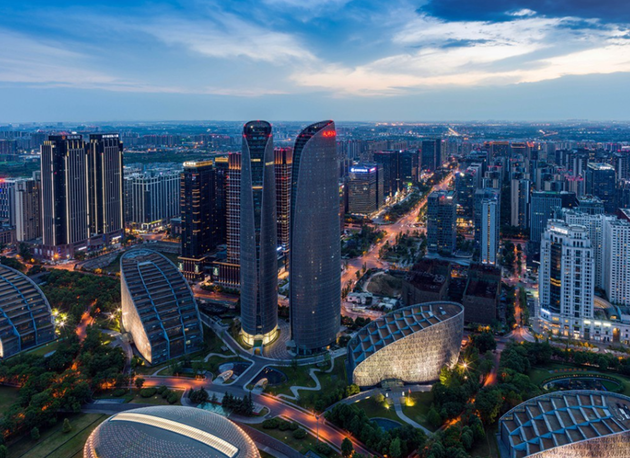
Photo/Xinhua
In 1991, the International Science Fiction and Fantasy Conference came to Chengdu, bringing together global science fiction writers, publishers, and more. This event marked the first international science fiction exchange activity held in China.
32 years later, the World Science Fiction Convention made its way to China again. Established in 1939, the convention is known for its focus on the celebration of science fiction and the prestigious Hugo Awards.
At its peak, it has gathered over 20,000 attendees. On October 18, with the opening of the 81st World Science Fiction Convention, Chengdu became the second Asian city to host this event, following Yokohama, Japan.
The fact that both of these major conventions chose Chengdu as their venue not only challenges our perception of Chengdu as the "City of Science Fiction" but also raises curiosity about why it was chosen.
Hosting the World Science Fiction Convention serves as a cornerstone for solidifying Chengdu as a creative hub and marks an important beginning for Chinese science fiction culture to break through internationally.
When the successful bid was announced, many science fiction writers sent their congratulations. Liu Cixin expressed, "After waiting for so long, Chengdu has finally obtained the right to host the World Science Fiction Convention. This is a moment worth recording in the history of Chinese science fiction. The reputation of Chengdu as the 'City of Science Fiction' will resound far and wide."
With less than a month left until the opening of the 81st World Science Fiction Convention, preparations are in full swing.
The main venue, shaped like a "nebula," has already taken form by the Jingrong Lake in the western part of Chengdu. Designed by Zaha Hadid, the entire city is immersed in a science fiction atmosphere.

Main venue of the World Science Fiction Convention
Regarding expectations for this convention, there are two aspects: cultural exchange and resource connections.
Wu Xiankui, chairman of the Sichuan Science Writers Association and the first recipient of the Galaxy Award for Science Fiction, mentioned that hosting the World Science Fiction Convention is an important opportunity for Chengdu to integrate into the world and attract global attention.
It is also an opportunity to accelerate the development of the science fiction industry in Chengdu, leveraging its imaginative, creative, and futuristic city image to engage in dialogue with the world. Wu Xiankui added, "The success lies in gaining influence through hosting the convention. In the future, talent gathering, creative hubs, and industry promotion will naturally fall into place."
What advantages does Chengdu have in this competition?

The Science Fiction World magazine
La Zi, editor-in-chief of the Science Fiction World magazine analyzed that Chengdu has already made attempts in various fields, including film, gaming, cultural and creative industries, cultural tourism, education, academic research, and study tour institutions.
Furthermore, Chengdu has already laid out top-level designs, industrial policies, and talent policies. Overall, "In an era when the science fiction industry is just beginning to take off, Chengdu is still at the forefront in China." La Zi noted.
La Zi mentioned that the development of the science fiction industry has its own characteristics. "The so-called science fiction industry belongs to the content industry and has a strong emphasis on intellectual property (IP). Based on this core IP, it can branch out like roots, engaging in the development, transformation, and operation of IP-authorized content. The unique feature of the science fiction industry is its 'secondary authorization and transformation.' The first stage involves adapting literary works into visual products such as films, games, and animations. The second stage involves expanding into derivative authorizations such as clothing, toys, food, daily necessities, and even cultural tourism and theme parks, building upon the visual imagery. It expands step by step."


 川公网安备 51019002001991号
川公网安备 51019002001991号





